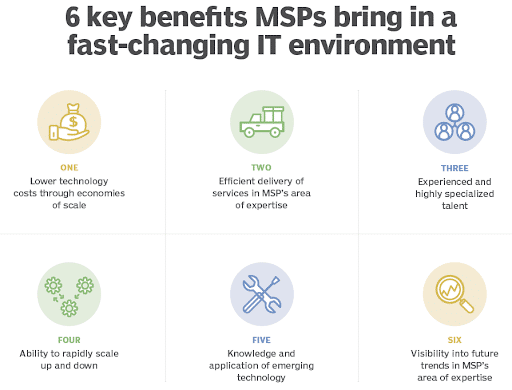
A Managed Service Provider (MSP) is a company that provides maintenance and support for organizations’ network infrastructure, systems on-premises, and remote assets. MSPs provide remote monitoring and management services for digital and hardware assets, along with users and access controls.
MSPs are designed to protect business continuity and prevent downtime and service interruptions, along with providing security and the monitoring we mentioned before. Most of the time, you will hear MSPs in relation to only IT services, but others extend into healthcare, legal, financial institutions, manufacturing, and ICT providers.
Though MSP services may often have their own technologies or focus on a single vendor, sometimes they utilize a collection of various tools in their operations from more than one source. Depending on the solution you are looking for, this may factor into your decision of which MSP is right for your organization.
What is MSP Software?
MSP software is a platform designed to manage a customized set of services for clients, including supply chain management, B2B integrations, and even as a virtual assistant. MSP tools provide remote error detection and mitigation, security alerts, and overall administrative task automation.
MSP software is divided up into four primary categories:
- RMM – remote monitoring and management solutions provide improved overarching visibility, event detection and mitigation, and AI-enhanced insights to improve efficiency.
- Remote Access Controls – Access end-systems and computer assets, whether servers, applications, files, or desktops, from remote locations without being onsite.
- Administration – Provide offsite accounting and HR management systems and support for relevant employees.
- Service Automation – Automation of support software operations and management and monitoring of support and technical staff.
Why are MSPs important?

As we’ve discussed earlier, MSPs provide a wide range of services to help take the load off of organizations to manage their networks and remote assets. We’ve collected a few of the essential functions and benefits MSPs can provide.
Keep your focus on your business
MSPs, by their modular nature, are relevant to small businesses and massive enterprises alike. Partnering with an MSP for many smaller organizations can help them compete with larger entities. By driving down costs originating in supporting these services independently, organizations can focus on driving economic growth instead of spending time and energy on operations.
Give IT a Break and save all in one
A growing challenge to organizations is ensuring all relevant employees are well-versed in company operations. As technology evolves, this becomes a neverending cycle of expending resources, especially for the IT department, to keep their knowledge up-to-date. MSPs provide experts and expertise in all the necessary fields to take that pressure off your IT and support departments, particularly if they are limited in staffing.
Proactive support, quick solutions
Your support staff can’t be on the clock 24/7; their availability is limited. This is where MSPs fill the gap in your support services. Some MSPs can even work successfully across multiple time zones around the clock for multinational organizations requiring support for different continents.
Preserve steady and continuous operations
The last thing any organization wants is to deal with is downtime, and the cost is growing. In 2021 the cost per hour of downtime was calculated to be $84,650, and the average outage lasted for 79 minutes. MSPs’ proactive nature means they will be able to predict these events using RMM tools and act to identify and mitigate the issues before they cause a break in continuity.
MSP vs. CSP - Clash of providers
We’ve talked quite a bit about MSPs, but Cloud Service Providers (CSPs) are beginning to gain more steam and provide the same services with even lower overhead. As business operations head further and further into the cloud, managing operations like MSPs have traditionally been insufficient.
Having a CSP to manage your burgeoning cloud assets is a must, as they can ensure you are using only the necessary tools and solutions for your organization’s needs. While MSPs often use 3rd-party services in tandem with their own, CSPs are usually the provider of 3rd-party solutions. Though MSPs can manage assets remotely, their scope is generally limited, whereas CSPs are easily scalable to provide global visibility and support.
However, this doesn’t mean CSPs are the future and will outmode MSPs, at least not yet. Organizations need a balance of both service providers to effectively control their upkeep to focus solely on the business side of operations. Fortunately, many of these service providers offer these services in tandem, so this doesn’t necessarily mean working with two entities.
Where does Galooli fit in?
Galooli’s remote monitoring and management solution is one of those critical tools for MSP firms. Our software is agnostic and, therefore, can interface with physical hardware and cloud assets, providing both managed and cloud services.
For organizations operating remote sites, smart buildings, data centers, or fleets, our solution can help manage these assets, regardless of their or your location. From tracking energy use and efficiency to carbon emissions and live event updates, Galooli’s RMM solution provides an overall look at the performance of your assets.


























